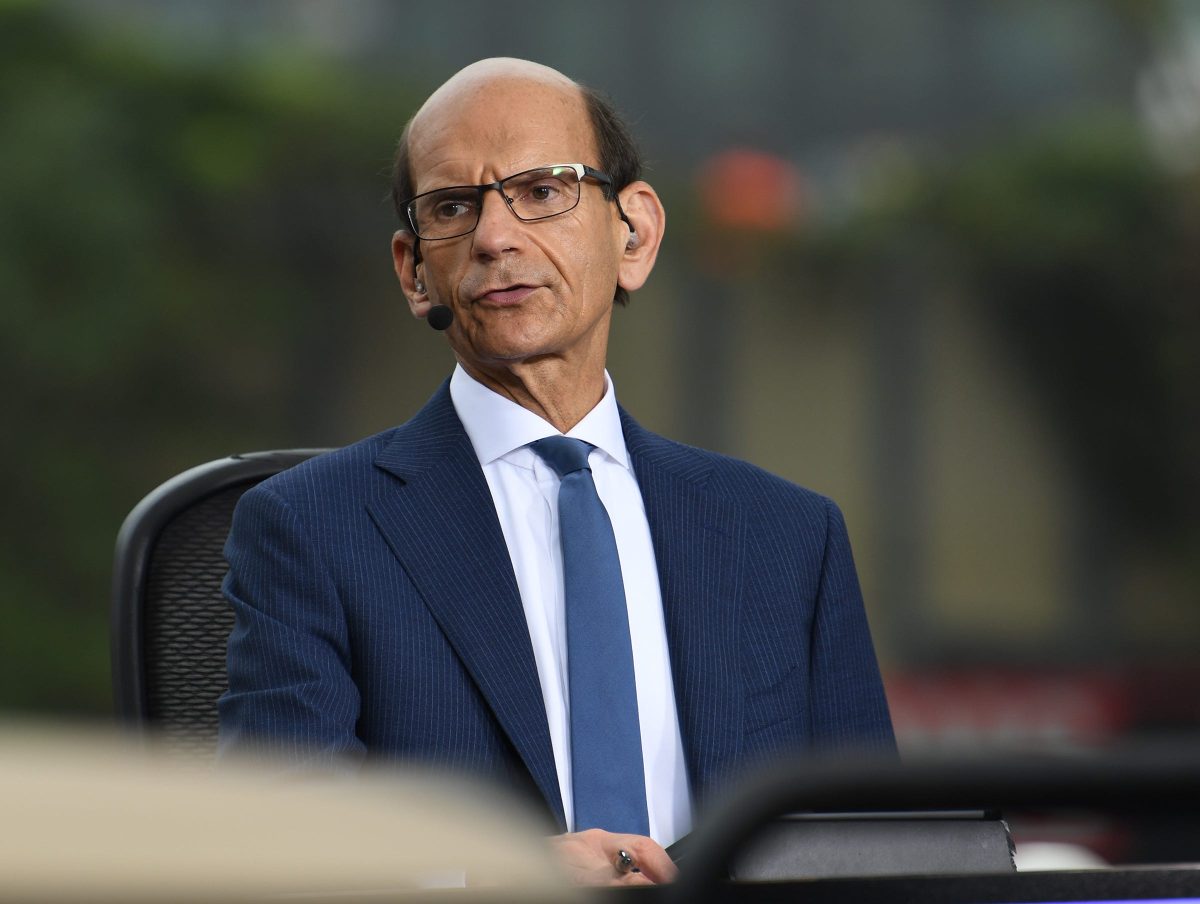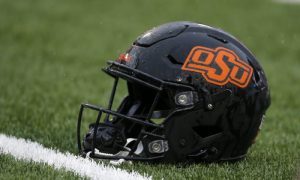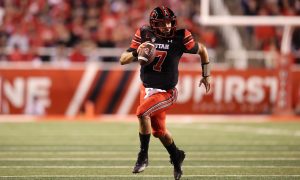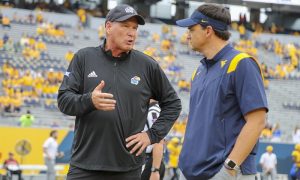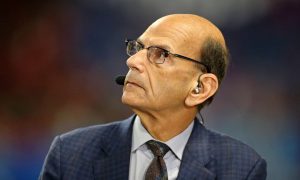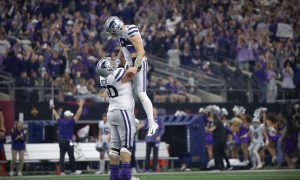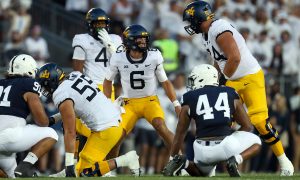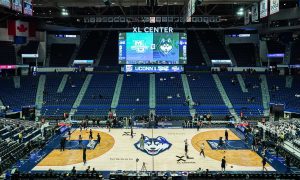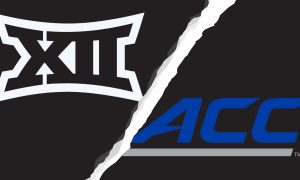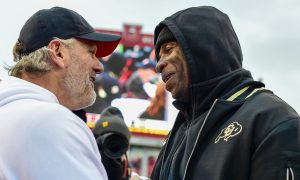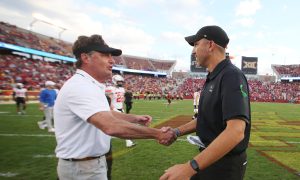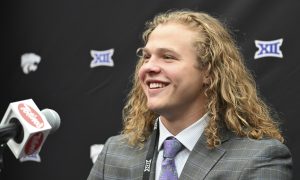This week, Heartland College Sports’ Pete Mundo was joined by Paul Finebaum for an interview to discuss the Big 12, the league’s future, the future of Name, Image and Likeness, and where the sport goes into the future.
Here is a Q&A of our entire conversation. You can also find it by subscribing to us on YouTube, or on iTunes or Spotify. Thanks for subscribing!
Pete Mundo: Paul, here is the number one thing my audience wanted to know, do you hate the Big 12 Conference?
Paul Finebaum: I do not, although I appreciate the question. I just, for whatever reason, just seem to be bumping heads with this conference over the years. I think it really started with TCU a couple years ago, and it just never seems to end. This week was Oklahoma State. As you know, there seems to be a lot of drama in this conference.
Mundo: When you look at the Big 12 landscape, is it the best conference in the country at the top? No, it’s not. But will it be the most entertaining conference in America come November?
Finebaum: I think it could. And to me not to try to patronize you and the network here, but if you had told me on July 20, 2021, when the news broke that Texas and Oklahoma were leaving, that this conference would still be healthy and we would be having substantive conversations, I would have been shocked. I thought it was dead.
So I think Brett Yormark and a lot of folks out there have done a really good job of salvaging what looked like a beaten down conference. It’s a really very entertaining one. I live in North Carolina, and I could walk down the street every day and not hear a single thing about the ACC. I bring that up to point out that I really think that the Big 12 is far more interesting and entertaining than the ACC, which used to think of itself as a competitor to the Big 10 and the SEC.
Mundo: So when you stack the hierarchy, is it clear then that Big 12 Is that No. 3 conference? And is there a path to create a Power 3 in college football, given that the ACC might be on the fritz?
Finebaum: I think the ACC is the key, and I don’t know any more than the next person on the litigious future of that conference, but it seems perilous. And when you consider that the two biggest names in the league, Florida State and Clemson, are at war with the conference office, it’s really a bad look, especially FSU.
So you know, where do they go and how do they accommodate? And I think that’s pretty obvious why they went out and brought in SMU, Stanford and California. Of the three, SMU probably brings the most to the table. From a football standpoint, I don’t know what in the world the other two are doing in there, other than they’re great academic institutions, and as we both know too often, Presidents who know nothing about college athletics make these decisions.
Mundo: You mentioned the Florida State-Clemson deal … From your sources in the SEC, is there really an appetite for more incredibly competitive football programs in that league?
Finebaum: I don’t think there’s any appetite right now. I mean, I’ve watched this thing over three years trying to incorporate two programs into the SEC. It’s very difficult. They didn’t even come up with a plan until Wednesday of this week for a tiebreaker system, and even that one goes on for about 60 pages. So things are complex. I think a lot of folks are still wrapping their arms around it.
Every time you bring in a new school, that means the pie gets divvied up even more. They are just now, starting next week, the brand new ESPN-ABC contract. Working at ESPN, I don’t think they’re eager to pay more money just to get a couple of more schools and, who would they get? North Carolina is the name you hear the most. Well, okay, I mean, does that mean anything to sec fans in Alabama or Louisiana or Texas? Not really.
Mundo: Let’s talk about your comments this week, where you questioned why a player would go play for Mike Gundy, after he said earlier in the week that basically he’s done talking contracts, he’s done talking money with guys. Your take was basically, it’s a new world in college football. But is it unreasonable, Paul to sit there, if you’re a coach, and say, just like you and I signed contracts? Radio, TV, hey, the deal is we’re not doing this stuff in season. We’ll talk to you in December. Why is that unreasonable? For Mike Gundy?
Finebaum: It’s not unreasonable, and I want to make it clear. A caller asked me about this and I was just simply rifting. I just want people to understand that I didn’t sit around like a Supreme Court justice coming up with that declaration. The reason why I criticize it, is not that it was wrong. I mean, yeah, I’ve been around a while. I tend to think that was probably a smart thing to think. But is it a smart thing to say in 2024 when that headline gets disseminated, I’m on, [ESPN’s] “Get Up!” yesterday, and it comes up and it goes out, and if you’re a high school player in in Texas or somewhere else, you’re going, “That guy doesn’t like NIL.” And I realize in the same conversation, we’re talking about QR code on the helmet. So it’s really the messaging. And you can like Mike Gundy or not, but the problem is, in today’s world, he came off in my mind as kind of the “Get off your lawn” guy. And before anybody says, “Have you ever been to Stillwater for a game?”, I have. I’ve been I was out there in 2013 when College GameDay was there for the Baylor game on a late November day that was sleeting, snowing, raining, and about 28 degrees. So I got, I got a good taste of Stillwater Oklahoma. Thank you.
Mundo: When it comes to NIL, there’s always, there’s been these rumors, reports that, I guess there were a couple of situations last year, and maybe this is going to continue on where players are holding out, like days before big games for checks. Is that happening? And if so, what does that mean for the future of NIL in college football?
Finebaum: Pete, it is happening. You look around, why do certain players leave? Let me give you an example, Quinshon Judkins, who was one of the best running backs in the SEC for Ole Miss, why is he now at [Ohio State]? Well, I think you just you laid out one of the scenarios at some point coaches say, I’ve had enough of this. I heard stories in Pasadena that Alabama players were hitting up coaches on the way to the National Semifinal about, “What am I getting after the season?” And you wonder why a week and a half later, Nick Saban said, “You know what, I probably had enough of all this.”
So it’s going on. Is it going on everywhere? No. Does that make what Mike Gundy said, wrong? No. I mean, he’s, he’s correct in what he said. The problem is, does he hurt? Do you hurt your you hurt your program? About being honest? I mean, it’s we’ve all faced that, that situation where we’re in a work place, and if I raise my hand in a meeting and tell the boss He’s a moron, everyone’s going to say you’re right. Will it get me fired? Yeah, yeah. So then what about you?
Mundo: You look at some of the Big 12 programs, like in Oklahoma State, a Kansas State and Iowa State, these programs are kind of doing it more the old-fashioned way, where they’re going to try to find the under-recruited guys, build them up over the years, and then they’re going to have to pay them something to hang around. Is that model still going to be effective, or are we looking at a world where the Big 12 could be left behind?
Finebaum: It’s a dangerous place to be right now. And I’m a big admirer of a number of programs you mentioned. K-State, Kansas, I think is a remarkable story, I had Lance Leipold on our show about three weeks ago, and I really like what he’s doing, and it’s sustainable within a certain framework. But does it? Does it play well against the top dogs in the league in college football, when you see what Ohio State did a couple of months ago? I mean, I’ve never seen anything like that. There’s reports of 20, $30 million was spent. That they went out in addition to going to Kansas State for a quarterback, they went to Ole Miss for a running back, and they went to Alabama and literally got the best defensive player out of there who was thinking about going to Georgia. That does not come cheap. And can a school like Kansas or Kansas State or Oklahoma State or TCU compete with that? No, and that’s really, unfortunately, the separation of the of the of the haves and the have nots right now in college football.
Mundo: Right now at Colorado, there was a report here this week that they met, or a former staffer met with the Saudi Arabian private equity firm that’s dealt with LIV Golf to try to get some potential cash infusion. And that’s a trillion dollar operation. We’ve seen what they’ve done overseas with soccer, with of course, live golf, as I mentioned, is that now a future, a realistic future for college football? And if so, where does it end?
Finebaum: It could be. I mean, I’ve heard a lot of Wall Street people look at college football and talk about how it is is undervalued. It’s hard for me to believe, with all the money that happens at the highest level, but these, these guys are always looking for something to invest in. And, I mean, yeah, is it dangerous? Sure. But I mean, if it was going to happen, I would think would happen to Colorado with
Deion Sanders.
Mundo: So then what’s the answer here? Is there a way to protect the integrity?
Finebaum: College football doesn’t have any integrity. And I say that as someone who, at the beginning of my career, was an investigative reporter for a newspaper, and I really thought I was going to save the world by finding out whether some high some college paid some high school recruit $500 and gave them a free suit.
You think about where we are now. Everyone puts on a good game, the conference commissioners and the presidents and, you know, they overuse this phrase, student-athlete, but that’s not what we’re talking about here. And, and I understand it. I don’t really blame the players. They they see what others, they see what’s happening. And they go, why can’t I get mine? It’s already seeping into high schools in a lot of the big markets. So where high school football is King and, and you know, the NCAA is a weak operation. We know that they, they have very limited enforcement powers. You know they can come down on Jim Harbaugh, who’s never coming back to college football, but they really can’t come down on a legitimate program unless they want to spend the next three years in court.
Mundo: If you were to place a bet on who’s going to be that team in the Big 12 that rises to the top over the next half decade in this league, who would you put that money on?
Finebaum: You start with Utah. They are a legitimate program, and have been for a very long time. I still think there, there’s some really good, good schools. The Kansas, Kansas State duo, I think, is significant, even though they do it a little bit differently, and even though I’m probably, I would probably fear for my wife this weekend in Stillwater, Oklahoma. That’s a program, but it does take things rather seriously, and I so I think, I think TCU is another one. My producer is a TCU graduate, so I know more about TCU than I really want to know.
Mundo: Is Sonny Dykes able to build a program that’s more like it was two years ago, getting to a National Championship? Or is this program going to be more of what it was last year, which is 5-7 and missing a bowl game?
Finebaum: I think the odds of them getting to a National Championship game are pretty slim, and frankly, they caught a bad break. Everyone just conveniently forgot that they beat Michigan to get to the National Championship Game. But, but that didn’t stop there. All of us in unison saying, how did we end up with this game?
I’ll tell you a funny story. I’ve sat with Stephen A. Smith before last year and railing about the absurdity of allowing TCU to be in the national championship game. I was also in in California on the morning of the game on first take when Stephen A. Smith predicted TCU to beat Georgia for the National Championship. And by the way, I’m not saying something that that’s secret. One million people watch the show, but that’s how quickly things change because of a terrible performance.
Mundo: So with that being said, you recently talked with Lance Leipold. Is there anything that compares to what KU has done in three and a half years under Leipold?
Finebaum: Not really. But I think the problem that comes from success is what happens next. And I know Lance Leipold’s name came up for jobs last year, and so do you. I believe it will happen again. I think that’s always the downside.
As as great as these stories are and they are, how do you turn them around? How do you maintain? How do you keep the coach there when one of the big dogs comes along? But I don’t have a comparison, because, yeah, it’s so rare to see something like that. TCU maybe didn’t surprise me as much, because, I mean, they are historically a big-time program. Kansas is not. Now when you look at the Big 12, you know they’ve got the auto-bid so they’re most likely going to have a buy in the College Football Playoff.
Mundo: Do you see the auto bid system hanging around? Or is there a day when the SEC and the Big 10 say this is ridiculous?
Finebaum: I think it will change. If I remember this correctly, to get this system in place, it had, it had to be, there had to be unanimity. So it’s hard to explain. I thought it was hilarious a couple of weeks ago in Dallas at the at the SEC media days when Nick Saban, who participated in the system, said, “I don’t know why we can’t have the 12 best teams.”
Well, because you have people in a room who have to get along, and you have to bring a lot of people in. But, I think that is changing. And you know, you’ve heard about this SEC-Big 10 cabal. That’s exactly what it is. There were some reports that the Big 10 wanted an automatic No. 1 seed for either the Big 10 or the SEC, which I think is patently ridiculous, But it also could be utterly ridiculous to see if we get a very low-rated Conference Champion from the ACC or the Big 12. We need to do it. We need to reshuffle the deck here. When the new contract comes along in 2026, I’m not advocating casting the ACC or the Big 12 winner to the hinterlands, but we really ought to see this thing as the 12 best teams, not the four protected conference champions.
Mundo: What should Brett Yormark be thinking about? What should he be doing to try to close that gap, or keep that gap where it’s at, between those Power Two and his own league?
Finebaum: Well, I would be aggressive. And I know he’s thinking that way. That’s his background. I would be continuing to think about expansion. I think Clemson and Florida State, quite frankly, would be a tremendous addition to the Big 12. I don’t know how realistic that is. But I think you have to keep thinking big.
I thought the expansion [by] the ACC made very little sense. I think going out and and getting the Western schools, from the Pac-12 was a very good move for the Big 12. I think it gives it a lot of cachet. Everything’s weird in college expansion, but I think the Big 12 came out of it, outside of the SEC, just adding only two very, very well.
Mundo: What are you looking forward to the most when it comes to the work, of course, you’re doing at ESPN, and and just the upcoming season with all the changes that we’ve got?
Finebaum: Well, one loss does not mean as much. These opening weekend games, let’s say we see some upsets. If you got upset in the past on Week 1, your chance of getting back in it was almost impossible. You could. Alabama did it last year by losing in Week 2. How’d they do that? They had to beat the No. 1 team in the country. That was really their only path. But even when we had the BCS, you couldn’t survive, probably, with a loss on the first weekend. So and then, you know what gets you in? You and I have both been asked a million times by colleagues, is it 10-2? Is it 9-3? I still don’t think people really know. I think there are circumstances where if you win a huge game late, like a conference championship, you might be able to get in with three losses, but I think right now, two losses is probably going to be the limit. In some leagues, it could even be one, no doubt about it.
Mundo: We appreciate you doing that as we put a bow on it, Paul, looking forward to all the coverage. I know a lot of our folks have admired from afar, and we appreciate you joining us and talking a little Big 12 in college football. And I’m glad we cleared the air. You do not hate the big 12.
Finebaum: I love the big 12. Pete, it’s my favorite conference on the face of the earth. So please stop all the hate.
Mundo: I’m holding you to that I’m holding you to it, Paul, thank you for the time. We appreciate it.
Finebaum: My pleasure.
Please subscribe to our YouTube channel (below) or find us on iTunes or Spotify by searching Heartland College Sports.

